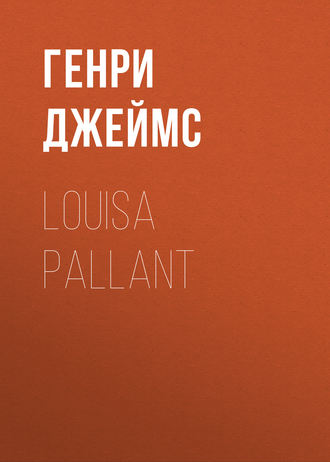
Генри Джеймс
Louisa Pallant
V
The charm of the evening had deepened, the stillness was like a solemn expression on a beautiful face and the whole air of the place divine. In the fading light my nephew's boat was too far out to be perceived. I looked for it a little and then, as I gave it up, remarked that from such an excursion as that, on such a lake and at such an hour, a young man and a young woman of common sensibility could only come back doubly pledged to each other.
To this observation Mrs. Pallant's answer was, superficially at least, irrelevant; she said after a pause: "With you, my dear man, one has certainly to dot one's 'i's.' Haven't you discovered, and didn't I tell you at Homburg, that we're miserably poor?"
"Isn't 'miserably' rather too much—living as you are at an expensive hotel?"
Well, she promptly met this. "They take us en pension, for ever so little a day. I've been knocking about Europe long enough to learn all sorts of horrid arts. Besides, don't speak of hotels; we've spent half our life in them and Linda told me only last night that she hoped never to put her foot into one again. She feels that when she comes to such a place as this she ought, if things were decently right, to find a villa of her own."
"Then her companion there's perfectly competent to give her one. Don't think I've the least desire to push them into each other's arms—I only ask to wash my hands of them. But I should like to know why you want, as you said just now, to save him. When you speak as if your daughter were a monster I take it you're not serious."
She was facing me in the rich short twilight, and to describe herself as immeasurably more serious perhaps than she had ever been in her life she had only to look at me without protestation. "It's Linda's standard. God knows I myself could get on! She's ambitious, luxurious, determined to have what she wants—more 'on the make' than any one I've ever seen. Of course it's open to you to tell me it's my own fault, that I was so before her and have made her so. But does that make me like it any better?"
"Dear Mrs. Pallant, you're wonderful, you're terrible," I could only stammer, lost in the desert of my thoughts.
"Oh yes, you've made up your mind about me; you see me in a certain way and don't like the trouble of changing. Votre siege est fait. But you'll HAVE to change—if you've any generosity!" Her eyes shone in the summer dusk and the beauty of her youth came back to her.
"Is this a part of the reparation, of the expiation?" I demanded. "I don't see what you ever did to Archie."
"It's enough that he belongs to you. But it isn't for you I do it—it's for myself," she strangely went on.
"Doubtless you've your own reasons—which I can't penetrate. But can't you sacrifice something else? Must you sacrifice your only child?"
"My only child's my punishment, my only child's my stigma!" she cried in her exaltation.
"It seems to me rather that you're hers."
"Hers? What does SHE know of such things?—what can she ever feel? She's cased in steel; she has a heart of marble. It's true—it's true," said Louisa Pallant. "She appals me!"
I laid my hand on my poor friend's; I uttered, with the intention of checking and soothing her, the first incoherent words that came into my head and I drew her toward a bench a few steps away. She dropped upon it; I placed myself near her and besought her to consider well what she said. She owed me nothing and I wished no one injured, no one denounced or exposed for my sake.
"For your sake? Oh I'm not thinking of you!" she answered; and indeed the next moment I thought my words rather fatuous. "It's a satisfaction to my own conscience—for I HAVE one, little as you may think I've a right to speak of it. I've been punished by my sin itself. I've been hideously worldly, I've thought only of that, and I've taught her to be so—to do the same. That's the only instruction I've ever given her, and she has learned the lesson so well that now I see it stamped there in all her nature, on all her spirit and on all her form, I'm horrified at my work. For years we've lived that way; we've thought of nothing else. She has profited so well by my beautiful influence that she has gone far beyond the great original. I say I'm horrified," Mrs. Pallant dreadfully wound up, "because she's horrible."
"My poor extravagant friend," I pleaded, "isn't it still more so to hear a mother say such things?"
"Why so, if they're abominably true? Besides, I don't care what I say if I save him."
I could only gape again at this least expected of all my adventures. "Do you expect me then to repeat to him—?"
"Not in the least," she broke in; "I'll do it myself." At this I uttered some strong inarticulate protest, but she went on with the grimmest simplicity: "I was very glad at first, but it would have been better if we hadn't met."
"I don't agree to that, for you interest me," I rather ruefully professed, "immensely."
"I don't care if I do—so I interest HIM."
"You must reflect then that your denunciation can only strike me as, for all its violence, vague and unconvincing. Never had a girl less the appearance of bearing such charges out. You know how I've admired her."
"You know nothing about her! I do, you see, for she's the work of my hand!" And Mrs. Pallant laughed for bitterness. "I've watched her for years, and little by little, for the last two or three, it has come over me. There's not a tender spot in her whole composition. To arrive at a brilliant social position, if it were necessary, she would see me drown in this lake without lifting a finger, she would stand there and see it—she would push me in—and never feel a pang. That's my young lady!" Her lucidity chilled me to the soul—it seemed to shine so flawless. "To climb up to the top and be splendid and envied there," she went on—"to do that at any cost or by any meanness and cruelty is the only thing she has a heart for. She'd lie for it, she'd steal for it, she'd kill for it!" My companion brought out these words with a cold confidence that had evidently behind it some occult past process of growth. I watched her pale face and glowing eyes; she held me breathless and frowning, but her strange vindictive, or at least retributive, passion irresistibly imposed itself. I found myself at last believing her, pitying her more than I pitied the subject of her dreadful analysis. It was as if she had held her tongue for longer than she could bear, suffering more and more the importunity of the truth. It relieved her thus to drag that to the light, and still she kept up the high and most unholy sacrifice. "God in his mercy has let me see it in time, but his ways are strange that he has let me see it in my daughter. It's myself he has let me see—myself as I was for years. But she's worse—she IS, I assure you; she's worse than I intended or dreamed." Her hands were clasped tightly together in her lap; her low voice quavered and her breath came short; she looked up at the southern stars as if THEY would understand.
"Have you ever spoken to her as you speak to me?" I finally asked. "Have you ever put before her this terrible arraignment?"
"Put it before her? How can I put it before her when all she would have to say would be: 'You, YOU, you base one, who made me—?'"
"Then why do you want to play her a trick?"
"I'm not bound to tell you, and you wouldn't see my point if I did. I should play that boy a far worse one if I were to stay my hand."
Oh I had my view of this. "If he loves her he won't believe a word you say."
"Very possibly, but I shall have done my duty."
"And shall you say to him," I asked, "simply what you've said to me?"
"Never mind what I shall say to him. It will be something that will perhaps helpfully affect him. Only," she added with her proud decision, "I must lose no time."
"If you're so bent on gaining time," I said, "why did you let her go out in the boat with him?"
"Let her? how could I prevent it?"
"But she asked your permission."
"Ah that," she cried, "is all a part of all the comedy!"
It fairly hushed me to silence, and for a moment more she said nothing. "Then she doesn't know you hate her?" I resumed.
"I don't know what she knows. She has depths and depths, and all of them bad. Besides, I don't hate her in the least; I just pity her for what I've made of her. But I pity still more the man who may find himself married to her."
"There's not much danger of there being any such person," I wailed, "at the rate you go on."
"I beg your pardon—there's a perfect possibility," said my companion. "She'll marry—she'll marry 'well.' She'll marry a title as well as a fortune.
"It's a pity my nephew hasn't a title," I attempted the grimace of suggesting.
She seemed to wonder. "I see you think I want that, and that I'm acting a part. God forgive you! Your suspicion's perfectly natural. How can any one TELL," asked Louisa Pallant—"with people like us?"
Her utterance of these words brought tears to my eyes. I laid my hand on her arm, holding her a while, and we looked at each other through the dusk. "You couldn't do more if he were my son."
"Oh if he had been your son he'd have kept out of it! I like him for himself. He's simple and sane and honest—he needs affection."
"He would have quite the most remarkable of mothers-in-law!" I commented.
Mrs. Pallant gave a small dry laugh—she wasn't joking. We lingered by the lake while I thought over what she had said to me and while she herself apparently thought. I confess that even close at her side and under the strong impression of her sincerity, her indifference to the conventional graces, my imagination, my constitutional scepticism began to range. Queer ideas came into my head. Was the comedy on HER side and not on the girl's, and was she posturing as a magnanimous woman at poor Linda's expense? Was she determined, in spite of the young lady's preference, to keep her daughter for a grander personage than a young American whose dollars were not numerous enough—numerous as they were—to make up for his want of high relationships, and had she invented at once the boldest and the subtlest of games in order to keep the case in her hands? If she was prepared really to address herself to Archie she would have to go very far to overcome the mistrust he would be sure to feel at a proceeding superficially so sinister? Was she prepared to go far enough? The answer to these doubts was simply the way I had been touched—it came back to me the next moment—when she used the words "people like us." Their effect was to wring my heart. She seemed to kneel in the dust, and I felt in a manner ashamed that I had let her sink to it. She said to me at last that I must wait no longer, I must go away before the young people came back. They were staying long, too long; all the more reason then she should deal with my nephew that night. I must drive back to Stresa, or if I liked I could go on foot: it wasn't far—for an active man. She disposed of me freely, she was so full of her purpose; and after we had quitted the garden and returned to the terrace above she seemed almost to push me to leave her—I felt her fine consecrated hands fairly quiver on my shoulders. I was ready to do as she prescribed; she affected me painfully, she had given me a "turn," and I wanted to get away from her. But before I went I asked her why Linda should regard my young man as such a parti; it didn't square after all with her account of the girl's fierce ambitions. By that account these favours to one so graceless were a woeful waste of time.
"Oh she has worked it all out; she has regarded the question in every light," said Mrs. Pallant. "If she has made up her mind it's because she sees what she can do."
"Do you mean that she has talked it over with you?"
My friend's wonderful face pitied my simplicity. "Lord! for what do you take us? We don't talk things over to-day. We know each other's point of view and only have to act. We observe the highest proprieties of speech. We never for a moment name anything ugly—we only just go at it. We can take definitions, which are awkward things, for granted."
"But in this case," I nevertheless urged, "the poor thing can't possibly be aware of your point of view."
"No," she conceded—"that's because I haven't played fair. Of course she couldn't expect I'd cheat. There ought to be honour among thieves. But it was open to her to do the same."
"What do you mean by the same?"
"She might have fallen in love with a poor man. Then I should have been 'done.'"
"A rich one's better; he can do more," I replied with conviction.
At this she appeared to have, in the oddest way, a momentary revulsion. "So you'd have reason to know if you had led the life that we have! Never to have had really enough—I mean to do just the few simple things we've wanted; never to have had the sinews of war, I suppose you'd call them, the funds for a campaign; to have felt every day and every hour the hard eternal pinch and found the question of dollars and cents—and so horridly few of them—mixed up with every experience, with every impulse: that DOES make one mercenary, does make money seem a good beyond all others; which it's quite natural it should! And it's why Linda's of the opinion that a fortune's always a fortune. She knows all about that of your nephew, how it's invested, how it may be expected to increase, exactly on what sort of footing it would enable her to live. She has decided that it's enough, and enough is as good as a feast. She thinks she could lead him by the nose, and I dare say she could. She'll of course make him live in these countries; she hasn't the slightest intention of casting her pearls—but basta!" said my friend. "I think she has views upon London, because in England he can hunt and shoot, and that will make him leave her more or less to herself."
"I don't know about his leaving her to herself, but it strikes me that he would like the rest of that matter very much," I returned. "That's not at all a bad programme even from Archie's point of view."
"It's no use thinking of princes," she pursued as if she hadn't heard me. "They're most of them more in want of money even than we. Therefore 'greatness' is out of the question—we really recognised that at an early stage. Your nephew's exactly the sort of young man we've always built upon—if he wasn't, so impossibly, your nephew. From head to foot he was made on purpose. Dear Linda was her mother's own daughter when she recognised him on the spot! One's enough of a prince to-day when one's the right American: such a wonderful price is set on one's not being the wrong! It does as well as anything and it's a great simplification. If you don't believe me go to London and see." She had come with me out to the road. I had said I would walk back to Stresa and we stood there in the sweet dark warmth. As I took her hand, bidding her good-night, I couldn't but exhale a compassion. "Poor Linda, poor Linda!"







